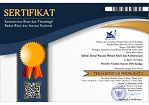Science-based Ijtihad: religious and scientific dialectic on fatwas regarding congregational worships amid the covid-19 pandemic
Abstract
Keywords
Full Text:
PDFReferences
Abdullah, M. A. (2014). Religion, Science and Culture, an Integrated, Interconnected Paradigm of Science. Al-Jami‘ah: Journal of Islamic Studies, 52(1), 175–203.
Al-Kahtani, T., Aljerian, K., Golding, B., & Alqahtani, S. (2015). Forensic science in the context of Islamic law: A review. Journal of Forensic and Legal Medicine, 34, 179–181.
Al-Suyuṭi. (n.d.). Al-Asybah wa an-Nazair. Dar al-Fikr.
Amri, P., Roesad, K., & Damuri, Y. R. (2020, April). How Can COVID-19 Enhance Our Environmental Commitments? CSIS Commentaries.
Arion, A.-C. (2018). Relationship Between Faith and Science in The Major World Religions. IFIJISR Icoana Redinței, 4(7), 51–66.
Asy-Syatibi, Ibrahim bin Musa. (1997). Al-Muwafaqat. Cet.1. Tahqiq: Masyhur Hasan Salman Daru Ibni Affan.
Arsyad, A. (2016). Integration Tree and the Interconnectivity of Science and Religion. Kalimah: Jurnal Studi Agama Dan Pemikiran Islam, 14(2), 115–138.
Auda, J. (2008). Maqasid Al-Shariah As Philosophy of Islamic Law, A Systems Approach. The International Institute of Islamic Thought.
Az-Zuhaili, W. (2013). Uṣul al-Fiqh al-Islâmy (Jilid I &). Dar al-Fikr al-Mu’ashir.
Bagir, Z. A. (2005). Integrasi Ilmu dan Agama, Interpretasi dan Aksi (Z. A. Bagir (ed.)). Mizan.
Baihaki, E. S. (2018). Preacher and Scientist: Integration of Science in Law Determination. Kaunia, 14(1), 1–4.
Barbour, I. G. (2002). Juru Bicara Tuhan Antara Sains dan Agama (diterjemah). Mizan.
Ebrahim, S. H., & Memish, Z. A. (2020). Saudi Arabia`s Measures to Curb the COVID-19 Outbreak: Temporary Suspension of the Umrah Pilgrimage. Journal of Travel Medicine, 27(3).
Ennis, M. C., McMillan, & Hedges, K. (2020). Pandemic Perspectives: Responding to COVID-19. Open Anthropology, 8(1).
Galadari, A. (2011). Science vs. Religion: The Debate Ends. The International Journal of Science in Society, 2(2), 1–9.
Gallegos, E. (2006). Reason in Islamic Law. Macalester Islam Journal, 1(1), 48–53.
Gennaro, F. Di, & Pizzol, D. (2020). Coronavirus Diseases (COVID-19): Current Status and Future Perspectives: A Narrative Review. International Journal of Environmental Research and Public Health, 17(2690), 1–11.
Guessoum, N. (2014). Islam dan Sains Modern (Terjemahan). Mizan.
Hallaq, W. B. (2009). An Introduction to Islamic Law. Cambridge University Press.
Hamid, S., Mir, M. Y., & Rohela, G. K. (2020). Novel coronavirus disease (COVID-19): a pandemic (epidemiology, pathogenesis and potential therapeutics). New Microbes and New Infections, 35(100679), 1–10.
Haught, J. F. (2004). Perjumpaan Sains dan Agama Dari Konflik ke Dialog (translated). Mizan.
Helmy, Y., Fawzy, M., & Elaswad. (2020). The COVID-19 Pandemic: A Comprehensive Review of Taxonomy, Genetics, Epidemiology, Diagnosis, Treatment, and Control. Journal of Clinical Medicine, 9(1225), 1–30.
Hillier, H. C. (2010). Muhammad Iqbal on al-fiqh: Towards a Natural Law Jurisprudence. Journal of Islamic Law and Culture, 12(3), 258–283.
Indriya, I. (2020). Konsep Tafakkur Dalam Alquran Dalam Menyikapi Coronavirus Covid-19. SALAM: Jurnal Sosial Dan Budaya Syar-I, 7(3), 211–216.
Kampf, G. (2020). Persistence of Coronaviruses On Inanimate Surfaces and their Inactivation with Biocidal Agents. Journal of Hospital Infection, 104, 246–251.
Malkawi, F. H. (2015). Epistemological Integration, Essentials of an Islamic Methodology (Translated). International Institute of Islamic Thought.
Meo, S. A., & Alhowikan, A. M. (2020). Novel Coronavirus 2019-ncov: Prevalence, Biological and Clinical Characteristics Comparison with SARS-CoV and MERS-CoV. European Review for Medical and Pharmacological Sciences, 24, 2012–2019.
Mufid, F. (2014). Islamic Sciences Integration. QIJIS: Qudus International Journal of Islamic Studies, 2(2), 144–160.
MUI. (2020). Fatwa Majelis Ulama Indonesia Nomor: 14 tahun 2020 tentang Penyelenggaran Ibadah Dalam Situasi Terjadi Wabah Covid-19. Majelis Ulama Indonesia. https://mui.or.id/category/produk/fatwa/
Mustaqim, A. (2010). Epistemologi Tafsir Kontemporer (1st ed.). LKiS.
Parish, H. (2020). The Absence of Presence and the Presence of Absence: Social Distancing, Sacraments, and the Virtual Religious Community during the COVID-19 Pandemic. Religions, 11(276), 1–13.
Qudsy, S. Z., & Sholahuddin, A. (2020). Kredibilitas Hadis dalam COVID-19: Studi atas Bazl al-Ma’un fi Fadhli al-Thaun karya Ibnu Hajar al-Asqalany. Al Quds Jurnal Studi Alquran Dan Hadis, 4(1), 1–18.
Read, Jonathan & Bridgen, Jessica & Cummings, Derek & Ho, Antonia & Jewell, Chris. (2020). Novel Coronavirus 2019-Ncov: Early Estimation Of Epidemiological Parameters And Epidemic Predictions.
Rolston, H. (1987). Science and Religion A Critical Survey. Random House.
Sabary, M. (2020). Fatawa al-Ulama Hawla Virus Kuruna. Dâr al-Basyîr.
Sanda, D. C., Alexandra, L., Smarandoiu, & Munteanu, C. (2017). The Dialogue between Science and Religion: A Taxonomic Contribution. Religions, 8(35), 1–18.
Shereen, M. A., & Khan, S. (2020). COVID-19 Infection: Origin, Transmission, and Characteristics of Human Coronaviruses. Journal of Advanced Research, 24, 91–98.
Shidiq, A. R. (2020, April 8). Our Health System Capacity Vs The Demand From A Large-Scale Social Distancing Policy. CSIS Commentaries.
Sholeh, M. A. N. (2020). Towards a Progressive Fatwa: MUI’s Response to the COVID-19 Pandemic. Ahkam, 20(2), 281–298.
Syukriya, A. J., & Faridah, H. D. (2019). Kajian Ilmiah dan Teknologi Sebab Larangan Suatu Makanan Dalam Syariat Islam. Journal of Halal Product and Research, 2(1), 44–50.
Tahir, A. H. (2015). Ijtihad Maqasidi, Rekonstruksi Hukum Islam berbasis Interkoneksitas Maslahah. LKiS.
Zabidi, A. Z. (2012). Paradigma Utilitarianistik dalam Istimbath Hukum Islam. Ihkam, 7(3), 368–382.
DOI: https://doi.org/10.18326/ijtihad.v21i1.79-98
Refbacks
- There are currently no refbacks.

This work is licensed under a Creative Commons Attribution-ShareAlike 4.0 International License.
Ijtihad: Jurnal Wacana Hukum Islam dan Kemanusiaan by http://ijtihad.iainsalatiga.ac.id/ is licensed under a Creative Commons Attribution-ShareAlike 4.0 International License








